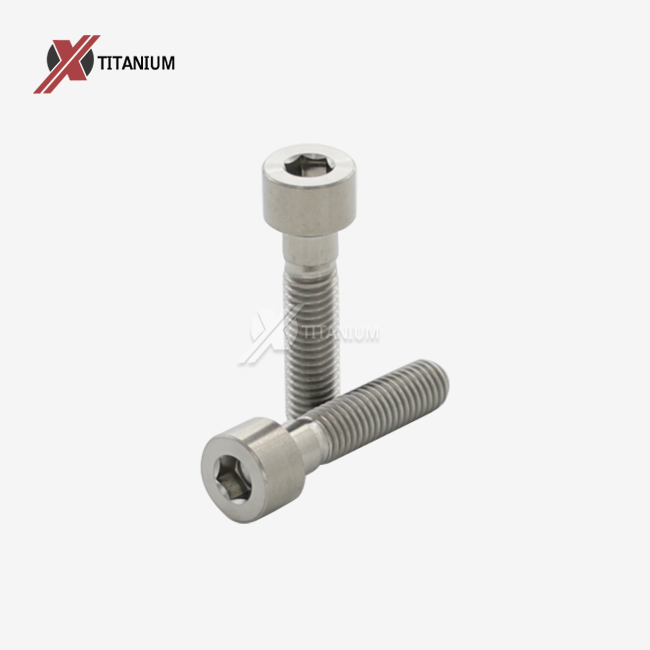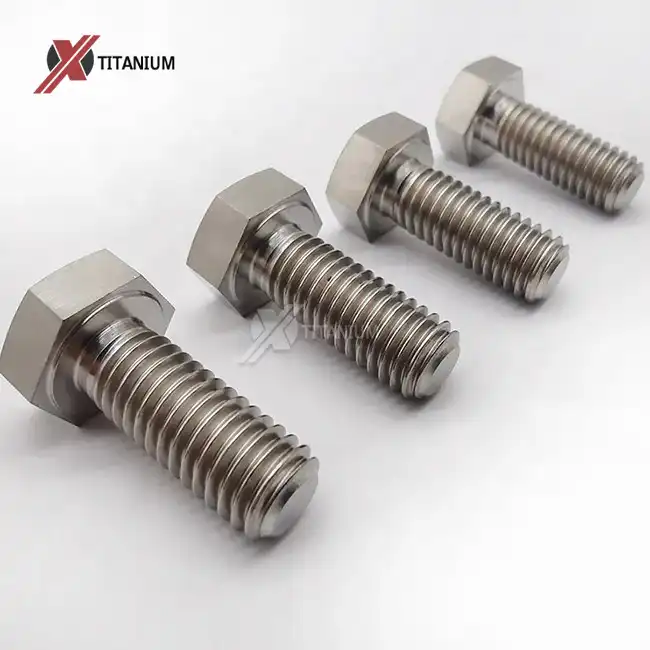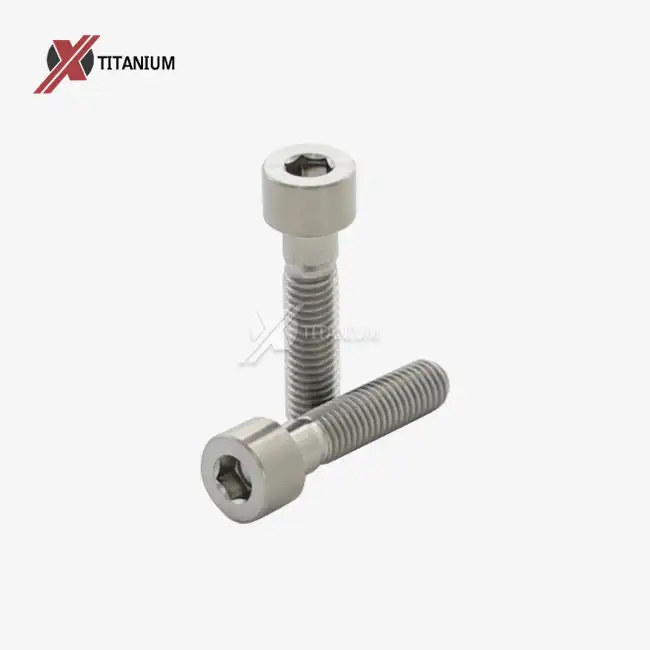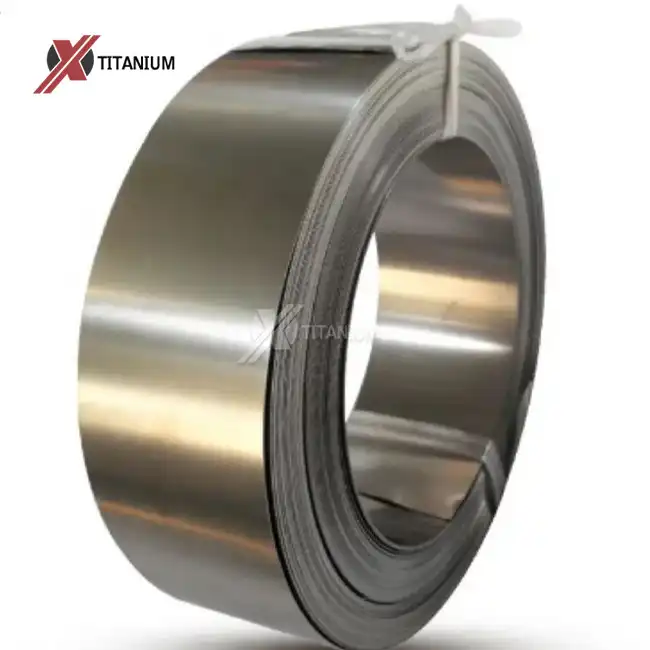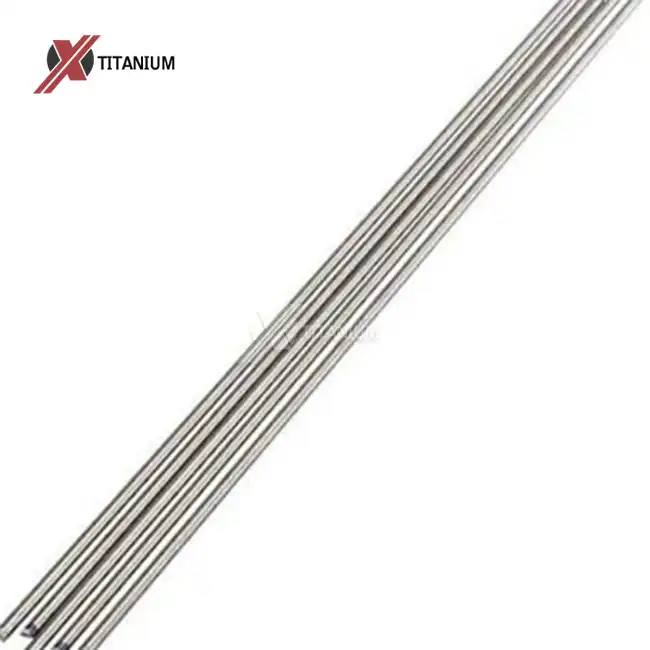The Science Behind Titanium's Corrosion Resistance
To truly appreciate how titanium socket head screws outperform their steel counterparts, it's essential to delve into the science behind titanium's remarkable corrosion resistance. This inherent property sets titanium apart from many other metals, including steel, and makes it a preferred choice for applications where longevity and durability are paramount.
Formation of Protective Oxide Layer
Titanium's exceptional corrosion resistance is primarily attributed to its ability to form a stable, continuous, and highly adherent oxide film on its surface. This phenomenon, known as passivation, occurs almost instantaneously when titanium is exposed to oxygen, whether in air or aqueous environments. The resulting titanium dioxide (TiO2) layer is incredibly thin, typically only a few nanometers thick, yet it provides a formidable barrier against corrosive attacks.
What makes this oxide layer so effective is its self-healing nature. If the surface is scratched or damaged, exposing fresh titanium underneath, the metal quickly reacts with oxygen to reform the protective layer. This continuous process ensures that titanium components, including titanium socket head screws, remain shielded from corrosive elements throughout their lifespan.
Electrochemical Nobility
Another factor contributing to titanium's superior corrosion resistance is its high electrochemical nobility. In the galvanic series, titanium is more noble than many other structural metals, including steel. This property means that when titanium is coupled with less noble metals in a corrosive environment, it's less likely to undergo galvanic corrosion. Instead, titanium often acts as the cathode in such scenarios, further protecting it from degradation.
This electrochemical advantage is particularly beneficial for titanium socket head screws used in multi-material assemblies. When these screws are used to fasten components made of different metals, they're less likely to initiate or accelerate corrosion at the interface, ensuring the integrity of the entire assembly.
Resistance to Pitting and Crevice Corrosion
Titanium exhibits exceptional resistance to localized forms of corrosion, such as pitting and crevice corrosion, which are often problematic for steel fasteners. Pitting corrosion occurs when small holes or cavities form on the metal surface, while crevice corrosion takes place in narrow gaps where fluid can stagnate. Both these forms of corrosion can lead to rapid deterioration of steel screws, compromising their strength and functionality.
Titanium socket head screws, on the other hand, resist these types of corrosion due to the stability of their passive oxide layer in a wide range of environments. This resistance is particularly valuable in applications involving exposure to chloride-containing media, such as seawater or de-icing salts, where steel fasteners would quickly succumb to corrosive attack.
Comparative Performance: Titanium vs. Steel Screws
When it comes to fastener selection, understanding the performance differences between titanium and steel screws is crucial. While both materials have their merits, titanium socket head screws often emerge as the superior choice in many demanding applications. Let's explore how these two materials stack up against each other in various performance metrics.
Corrosion Resistance
As discussed earlier, titanium's corrosion resistance far surpasses that of steel. Steel screws, even when treated with protective coatings or made from stainless alloys, eventually succumb to corrosion in harsh environments. This degradation can lead to weakened structural integrity, potential failure, and unsightly rust stains. Titanium socket head screws, conversely, maintain their appearance and performance characteristics even after prolonged exposure to corrosive elements.
In saltwater environments, for instance, titanium screws can last indefinitely without significant corrosion, while steel screws may begin to show signs of rust within months or even weeks. This longevity translates to reduced maintenance costs and increased reliability in critical applications.
Strength-to-Weight Ratio
Titanium boasts an impressive strength-to-weight ratio, outperforming steel in this crucial metric. Titanium socket head screws can provide equivalent or superior strength to steel screws while weighing significantly less. This property is particularly advantageous in weight-sensitive applications such as aerospace, automotive, and sporting goods manufacturing.
For example, a titanium screw can typically achieve the same tensile strength as a steel screw while being up to 45% lighter. This weight reduction can lead to substantial fuel savings in transportation applications or improved performance in high-speed machinery where every gram matters.
Fatigue Resistance
Fatigue resistance is another area where titanium screws excel compared to their steel counterparts. Titanium's unique crystalline structure and high strength-to-weight ratio contribute to its superior resistance to cyclic loading and stress. This property is crucial in applications where fasteners are subjected to repeated loads or vibrations.
In aerospace applications, for instance, titanium socket head screws can withstand the constant vibrations and stress cycles experienced during flight much better than steel screws. This enhanced fatigue resistance translates to increased safety, longer service life, and reduced maintenance requirements.
Thermal Expansion
Titanium's coefficient of thermal expansion is lower than that of steel, which can be a significant advantage in applications involving temperature fluctuations. When materials expand and contract at different rates due to temperature changes, it can lead to loosening of fasteners or stress concentration at joint interfaces.
Titanium socket head screws, with their lower thermal expansion rate, maintain a more consistent fit across a wide temperature range. This property is particularly valuable in applications such as engine components or structures exposed to extreme temperature variations.
Applications Benefiting from Titanium Socket Head Screws
The unique properties of titanium socket head screws make them ideal for a wide range of applications across various industries. Their combination of corrosion resistance, high strength-to-weight ratio, and biocompatibility opens up possibilities that are often unattainable with traditional steel fasteners. Let's explore some of the key applications where titanium screws shine.
Aerospace and Aviation
The aerospace industry is perhaps one of the most prominent beneficiaries of titanium socket head screws. In aircraft construction, every gram matters, and the lightweight yet strong nature of titanium fasteners contributes significantly to overall weight reduction. These screws are used in critical components such as engine mounts, wing attachments, and fuselage assemblies.
Titanium's excellent fatigue resistance ensures that these fasteners can withstand the constant vibrations and stress cycles experienced during flight. Moreover, their corrosion resistance is crucial for withstanding exposure to various atmospheric conditions and altitudes. In spacecraft applications, titanium screws are favored for their ability to perform reliably in the extreme conditions of space, including vacuum and temperature fluctuations.
Marine and Offshore Industries
The marine environment is notoriously harsh on metals, with constant exposure to saltwater and humid conditions. Titanium socket head screws excel in this challenging setting, resisting corrosion where steel fasteners would quickly deteriorate. They are widely used in shipbuilding, offshore oil and gas platforms, and underwater equipment.
In boat construction, particularly for high-performance and luxury vessels, titanium screws are used for deck fittings, engine mounts, and structural connections. Their corrosion resistance not only ensures longevity but also maintains the aesthetic appeal of the vessel by preventing unsightly rust stains. In underwater applications, such as remotely operated vehicles (ROVs) or subsea sensors, titanium fasteners provide reliable performance without the need for frequent replacement or maintenance.
Medical and Dental Implants
The biocompatibility of titanium makes it an excellent choice for medical and dental applications. Titanium socket head screws are widely used in orthopedic implants, such as bone plates and joint replacements. Their corrosion resistance is crucial in the body's internal environment, preventing adverse reactions and ensuring long-term stability of the implant.
In dental implantology, titanium screws serve as the foundation for artificial teeth. Their ability to osseointegrate, or fuse with bone tissue, makes them ideal for creating a stable and long-lasting dental prosthesis. The use of titanium fasteners in medical devices also extends to external fixators, surgical instruments, and medical imaging equipment, where their non-magnetic properties are advantageous.
Chemical Processing and Energy Sector
Industries dealing with corrosive chemicals or extreme environments often turn to titanium socket head screws for their superior resistance to degradation. In chemical processing plants, these fasteners are used in reactors, heat exchangers, and piping systems where exposure to acids, alkalis, or chlorides is common.
The energy sector, particularly in areas like geothermal power generation or offshore wind farms, benefits from the durability of titanium screws. In geothermal applications, these fasteners can withstand the hot, mineral-rich fluids encountered in deep wells. For offshore wind turbines, titanium screws provide a corrosion-resistant solution for components exposed to constant sea spray and harsh weather conditions.
Conclusion
the superior corrosion resistance and performance characteristics of titanium socket head screws make them an invaluable asset in numerous industries. From aerospace to medical applications, these fasteners offer solutions to challenges that conventional steel screws simply cannot meet. As industries continue to push the boundaries of material performance, the role of titanium screws in enabling innovation and reliability is likely to grow even further. For more information on titanium products and their applications, please contact us at info@cltifastener.com or djy6580@aliyun.com.
